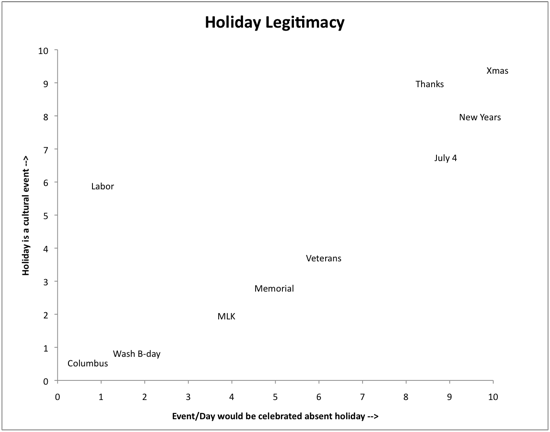I had the day off today. It’s Columbus Day. As usual, I got a lot of gruff from my non-federal-employee neighbors who can’t even fathom having Columbus Day off. I’m pretty sure they have a point: Columbus Day is, bar far, the least legitimate federal holiday. What follows is some psuedo social science to back up this claim.
There are ten federal holidays: New Year’s Day, Martin Luther King Jr. Day, Washington’s Birthday, Memorial Day, Independence Day, Labor Day, Columbus Day, Veterans’ Day, Thanksgiving, and Christmas. The chart below plots them on two dimensions.
1) To what degree would the event be celebrated/commemorated absent the federal holiday. Was the holiday significant prior to government recognition? Would it be without it? Does the private sector shut down? In essence, is the government holiday just a reflection of private reality, or is the holiday driven by the law.
2) To what degree is the day off itself a cultural event. Do people get together with family or friends? Are there parades? Do you go over and see your neighbors for a barbecue? Do you think/talk about it at your dinner table? In essence, to what degree do you know its a holiday besides the fact that you aren’t going to work.
Here’s an analysis of what I see in the chart.
The big four stand far ahead of the rest. Christmas, New Year’s, Thanksgiving, and Independence day all rate high on both dimensions. Christmas (10 on the private-reality scale / 10 on the cultural scale) is ahead of everything else on both the private-reality dimension and the cultural significance dimension. Thanksgiving (8/9) is only slightly behind Christmas on the cultural dimension, but a few paces back on the private-reality scale. New Year’s (9/8) is probably the reverse of that: only slightly behind Christmas on the private-reality dimension, but a few paces back on cultural significance. Independence Day (8/8), I think, is a few paces back on both dimensions.
Two secondary holidays were historically more important. Both Veteran’s Day (6/4) and Memorial Day (5/3) were much more important holidays 50 years ago, from what I perceive. You still have the parades and wreath layings, but you also see some things now that would never have happened in the 50s: the public schools in my town are open on Veteran’s Day. In addition, whereas Veteran’s Day would have been an automatic private sector day off 50 years ago, today it is either not a day off or a flex day for many private sector employees.
Labor Day is a complete outlier. I didn’t put a trend line in the chart, but most of the data would have fit it nicely. Not Labor Day (1/6). That’s the one holiday that is an absolute cultural touchstone in America, but very, very few people would observe it in any way if it wasn’t a day off. It really has become a day to play hooky from work with all your neighbors.
I’m not sure how to classify either of the “person” days. Washington’s Birthday (2/1) has been stripped of a lot of meaning now that many people believe the holiday is “President’s Day.” (It’s not, at least at the federal level). They day has some historical significance, but like Veteran’s Day and Memorial Day, it was probably a lot stronger in generations past. I imagine Washington’s Birthday was something of a big deal in the 19th century, even as a private celebratory day. As a contemporary matter, it has no real cultural impact that I can detect.
Martin Luther King Jr. Day (4/1) is an even tougher call. I’m pretty sure there would be strong private celebrations of it if it did not exist, especially in the African-American community (although I’m pretty sure they would be on April 4 — the day he was assassinated — not on a Monday near his birthday (January 15) ). The cultural significance is tough to judge, too. I notice a little bit every year, like speech readings and other academic things, but again, I don’t have a great sense of what goes on in the African-American community. And I suspect there might be a fair amount there.
There’s one fake holiday on both dimensions. And that’s Columbus Day. Everyone always tries to tell me that it’s a big Italian-American thing, but I’ve never seen any evidence of that. I guess the Knights of Columbus must do something, but I’ll be damned if I’ve ever heard of anyone going to something like that. It’s not like the Hibernians on St. Paddy’s Day. In fact, I think the counter-protests to the day (which I saw first hand at Yale) were the only discernible group event I ever saw.


I agree with your point about Columbus Day, but given that 20% of Americans are not Christian, I’d say that Thanksgiving does not lag behind Christmas on either count if you factor in the entire citizenry of the country.
I thought about that for a while when I was writing the post. On the cultural significance, maybe you are right, although Christmas is a multi-billion dollar business, and all Thanksgiving has is a massive travel situation.
On the other dimension, I think you are absolutely wrong. If neither holiday had ever been made a legal holiday, I think many many more people would take time off for Christmas than Thanksgiving. I remember having a discussion with my grandparents about Thanksgiving in the 20s, prior to the legal holidays. They used to have it on the last Sunday in November, and just had a big family dinner. That’s not nothing, but I think it’s evidence that the legal holiday shaped the tradition, more than reflected it. (At least in reference to Christmas; both of them are obviously quite high on the organic scale).
Pingback: Not my favorite holiday | Matt Glassman